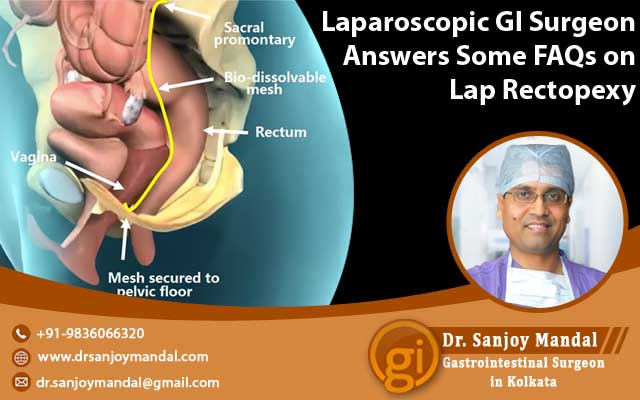A surgical procedure that addresses rectal prolapse is laparoscopic rectopexy. Patients have a lot of questions about this medical procedure, and Dr. Sanjoy Mandal, a renowned gastroenterology surgeon in Kolkata has answered them in this blog.
Q: Why have a laparoscopic rectopexy instead of an open one?
A: Both open and laparoscopic methods are used to do rectopexy. Good laparoscopic surgeons, on the other hand, highly approve of the laparoscopic procedure because it is a minimally invasive surgery with numerous advantages and a higher success rate than traditional open surgery. When compared to an open rectopexy, the following are some of the advantages of a laparoscopic rectopexy:
- Incisions or cuts are kept to a bare minimum
- There is little or no blood loss
- Infection risks are minimal
- There is less discomfort
- There are no complications
- A shorter stay in the hospital
- Quick recovery
- A higher rate of success
- Totally risk-free
As a result, laparoscopic rectopexy is far more popular and in high demand than traditional open surgery. Dr. Mandal is a skilled laparoscopic rectal prolapse surgeon in Kolkata who performs laparoscopic rectopexy with the most up-to-date techniques and equipment.
Q: What is the procedure for laparoscopic rectopexy?
A: During a laparoscopic rectopexy, the patient is given anaesthetic before the procedure is carried out. The top laparoscopic gastrointestinal surgeon in Kolkata then makes a few small incisions in the patient’s abdomen through which a laparoscope (a thin medical instrument with a high-intensity light and a high-resolution camera at its end) and other surgical tools designed specifically for laparoscopic surgery are inserted to repair the prolapsed rectum.
Q: Is it possible for rectal prolapse to recur after a laparoscopic rectopexy?
A: The odds of recurrence after laparoscopic rectopexy are exceedingly low because the surgeons replace the conventional stitches with a surgical mesh after repairing the bulging rectum. The surgical mesh keeps the rectum in place, preventing the patient from developing a reoccurring prolapsed rectum.
Q: What precautions should a patient take following a laparoscopic rectopexy?
A: Fortunately, laparoscopic rectopexy has fewer risks than traditional rectopexy. Nonetheless, the patient should consider some safety precautions after surgery. After a laparoscopic rectum repair, there are some precautions to take.
- Drink plenty of water as well as other fluids such as fruit juices, coconut water, and other similar beverages
- Consume a variety of fresh fruits and vegetables (after the soft diet phase is over)
- Sports and other outside activities should be avoided
- Do not engage in any strenuous exercise, including heavy lifting
- Get lots of sleep and rest
- To avoid infection (which is extremely rare), keep your surgical incisions dry and clean, and wear loose clothing
- For post-surgical check-ups, make an appointment with your doctor
To avoid constipation and recurrent prolapsed rectum, the best laparoscopic surgeon in Kolkata may recommend stool softeners after surgery.
